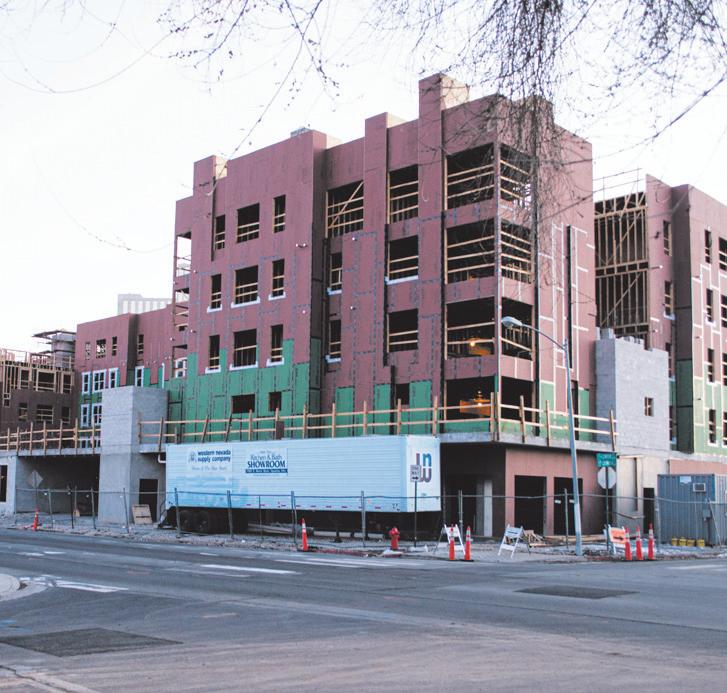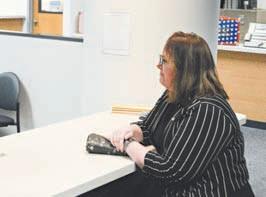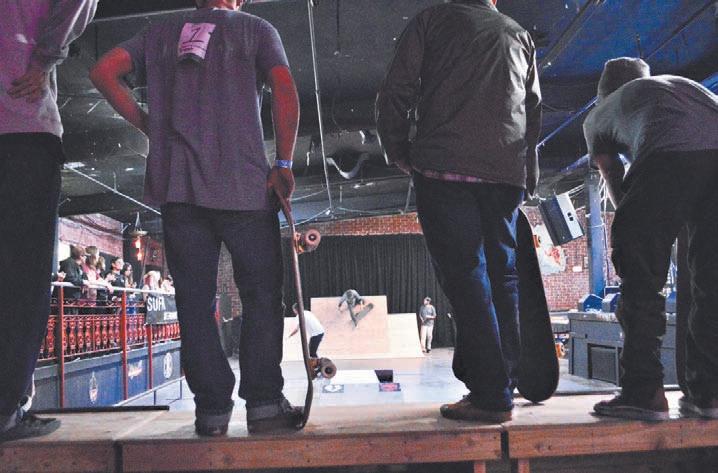
7 minute read
NEWS
from March 5, 2020
ON FILE
On March 2, Nevada kicked off a two-week filing period for candidates seeking election and reelection to appear on the ballot. The primary election will take place June 9, with early voting from May 23 to June 5. The general election is Nov. 3, with an early voting period extending from Oct. 17-30.
Advertisement
Candidates who appeared at the Washoe County Clerk’s office on the first day of filing included Richard “Skip” Daly, who’s running for the Nevada Assembly seat he currently holds for District 31; Teresa Benitez-Thompson, the Assembly’s Majority Floor Leader and representative of District 27; and Natha Anderson, who’s running to represent District 30.
Anderson, who’s a teacher and lobbyist for the Nevada State Education Association, spoke about the educational priorities she’d pursue if elected.
“I would say that fixing the education funding formula is number one, which is already going to be a large, large point of contention, I believe,” she said. “I would say number two would have to be our class sizes. We have to start addressing them—our class sizes and case loads. … When it comes to our counselors right now, we’ve got some of our elementary school counselors who’ve got 700 kids on their case loads. It’s very difficult to offer the social and emotional Natha Anderson filed to run for Nevada learning neces-Assembly District 30 on March 2. sary when you’ve PHOTO/JERI DAVIS got so many.”
Anderson said that addressing education funding would require taking a look at the state’s current tax structure.
“Do we have everything the way we should?” she said. “Are there other elements that should also be considered? And when I say elements, I mean some of the loopholes. Do we need to continue to have all of those loopholes? And, if so, great—but let’s try to figure out if it’s been helping us or not, as a community.”
Examples of the loopholes Anderson would like to take a closer look at include things like the corporate welfare the state has so readily handed out to large companies like Tesla, deferring their taxes that might otherwise be put toward infrastructure needs like schools.
Anderson supported the WC-1 ballot question of 2016 that raised Washoe County’s sales tax to one of the highest in the nation. She said she’s been pleased with the way funds from the higher taxes have been utilized.
“I think we’re doing the best we can with how quick we can get our buildings done, our reconfigurations that are necessary,” Anderson said. “We’re really trying to get the needs to our students as much as possible. I look at Poulakidas [Elementary School]. It’s awesome. … When I go to Poulakidas, the kids are just beaming. And it just makes you so happy.”

—JERI DAVIS
Canyon Flats, 661 N. Center St., will house about 506 university students and staff.
PHOTO/TEMI DUROJAIYE
Bring it home
University settles housing situation for 2020-2021
The University of Nevada, Reno recently finalized accommodation plans for first-year students in the 2020-2021 academic year, as the university continues to recover from the devastating accident last July that decommissioned two of its dorm halls, Nye and Argenta.
On Feb. 18, the university announced that it had reached an agreement to lease the 838 beds needed from two off-campus apartment complexes currently under construction. Canyon Flats, 661 N. Center St., will house about 506 students and staff, while Uncommon Reno, 1669 N. Virginia St., will accommodate about 330 students and staff.
“This is all just incredibly good fortune,” said Shannon Ellis, vice president for the university’s Division of Student Services. “We got lucky that we had these two apartment buildings, one up on Virginia and one right here on Center Street, that they were well under construction and that they would meet the needs of what our numbers were.”
The two off-campus options will replace Wolf Pack Tower, which housed 1,300 students and staff, after the university declined to purchase the building or renew its $21 million lease with the Circus Circus.
However, the university does not intend to rebrand or rename either of the apartment complexes like it did with Wolf Pack Tower. The only expected changes are the removal of perks such as rooftop hot tubs, free tanning, and a pet care station, which were initially advertised by the complexes but are not part of the university’s residence plan and will be on hold for the duration of UNR’s lease.
The apartment complexes offer varying housing options from studios to four-bedroom apartments and will approximate the dorm experience— including study areas, exclusive access to only students and staff, full-time, live-in staff, and more. Additionally, housing rates will mirror the cost of living in a residence hall, and range in price from $3,400 to $5,000 per semester.
The deal for both apartment complexes will cost $10.1 million and will be paid primarily from insurance settlements.
The university began to look for a new deal after it was certain that Nye Hall—which houses 530 students— would be reopened in August, following minor renovations to windows, electrical fittings, as well as repairs to the damaged lobby. The renovation costs are just under $10 million dollars, which will also be covered by the insurance.
“When it became clear to us in the fall, probably at the end of October, that Nye Hall would be able to be repaired and back online this summer, we realized we didn’t need the entire tower,” Ellis said. “That became the determining factor.”
There are no plans to use the offcampus accommodations beyond this year, and students can expect to be in regular dorm residences when Argenta Hall opens at the start of the Fall 2021 semester. Renovations on Argenta Hall are yet to begin, but Ellis expects work to start in the summer and for it to be completed in time.
LOOKING FORWARD
Although accommodation plans for this year’s class of freshmen have been finalized, housing remains a challenge for students as well as the university. The university’s population has grown by over 3,000 students in the last decade and might grow even more over the next decade, making affordable residential options more paramount.
Just a few days prior to the accident on July 5, 2019, the university had put out a request for proposals to build affordable student housing on top of its parking structure on Sierra Street for sophomores, juniors and seniors. However, those plans were shelved in order to manage the situation in Argenta and Nye Halls.
“We just didn’t know in the days following,” Ellis said. “We didn’t know if Argenta would have to be torn down. We didn’t know if Nye could stay. And, so, the head of facilities called me and I said, ‘Can you just pull it, and we’ll figure out later what we’re going to do?’ Because we had bigger things on our mind.”
Ellis expects the plans for proposals and bids from contractors to be reopened at some point. Additionally, the university hired Dean Kennedy as the executive director for Residential Life, Housing and Food Services last week, and Ellis said that the new director will oversee a new five-year housing strategic plan.
“I would recommend conducting a housing market study that would complement the strategic enrollment management plan, both of which would inform our direction moving forward,” Kennedy said about the plan, via email this week.
He also mentioned that the university will continue to guarantee on-campus accommodation for first-year students who apply the appropriate deadline—and they are currently exploring how to provide on-campus housing for students for multiple years.
Kennedy said that the housing construction occurring around campus makes it difficult to get a clear idea of the supply and demand for student housing, both on and off-campus. Making data-driven decisions in the current circumstances will be a challenge for the new director and the university, and the first step will be learning as much as they can about the situation. “Research would be the word,” Kennedy said about their approach. “Housing market analysis—both for on and off campus housing.” Off-campus housing in the nearby areas also still remains an option for a lot of students, although rent prices have been steadily rising over the past few years—with current prices ranging from $600 to $1,300. In the meantime, UNR contin-
“We got lucky that we had ues to make strides towards returning to normalcy. In addition to the renovations these two apartment on the damaged dorms, buildings … well under construction and that they the school recently opened a new engineering building and will be would meet the needs of what building a new business our numbers were.” building soon. Ellis said that discussions about Shannon Ellis other construction work Division of Student or buildings will resume Services VP once renovation on Nye and Argenta Halls is complete. Nearly eight months after the devastating accident that had them scrambling, the university is managing the recovery efforts well. “I think people have discovered, parts of them, myself included, that you didn’t know existed,” Ellis said. “Because a lot of us have been here a while and done this a long time. There is a lesson: you’ve never seen it all.” Ω
Rocking and rolling












